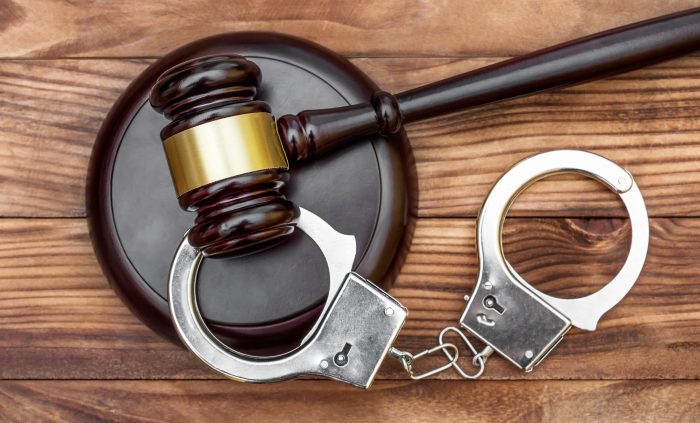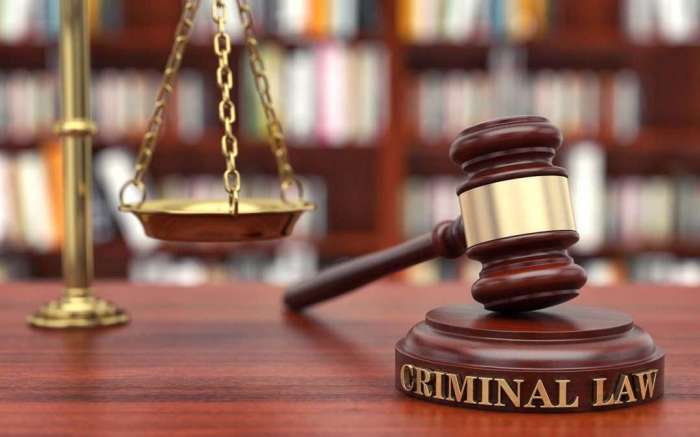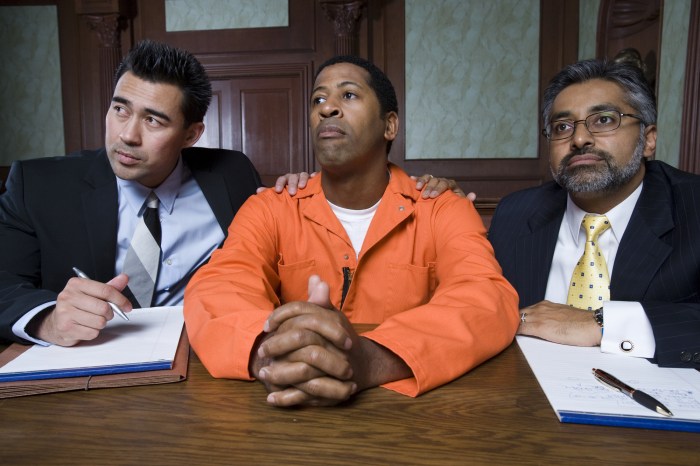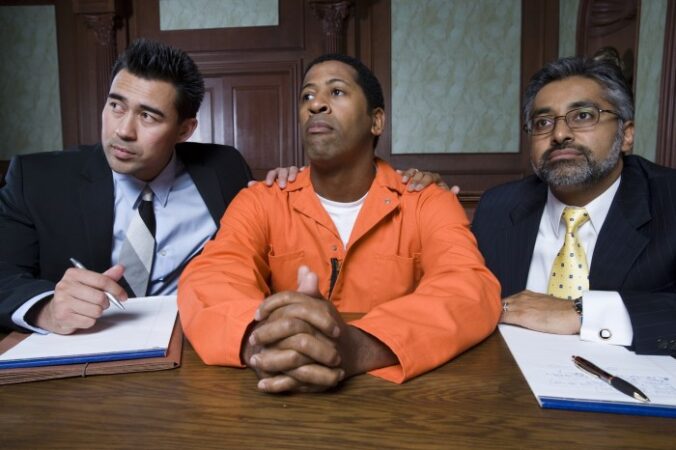
Lawyer for criminal: Navigating the complex world of criminal law can be daunting, but having a skilled and experienced lawyer by your side can make all the difference. This guide explores the crucial role of a criminal defense attorney, from understanding their responsibilities to finding the right advocate for your needs.
The criminal justice system is a intricate web of laws, procedures, and potential consequences. Understanding the different types of criminal offenses, the elements of a crime, and the process of building a defense strategy is essential for anyone facing criminal charges. A criminal defense lawyer acts as your legal advocate, guiding you through the legal maze and ensuring your rights are protected.
Understanding Criminal Law

Criminal law is a complex and multifaceted area of law that governs conduct considered harmful to society. It aims to protect individuals and property, maintain order, and deter future criminal activity. This section will provide a comprehensive overview of criminal law, covering its fundamental principles, types of offenses, and the workings of the criminal justice system.
Types of Criminal Offenses
Criminal offenses are categorized based on their severity and the nature of the crime. Understanding these categories helps in comprehending the legal consequences and penalties associated with each offense.
- Felonies: These are serious crimes, often involving violence, significant property damage, or substantial financial loss. Felonies typically carry heavy penalties, including lengthy prison sentences and substantial fines. Examples include murder, rape, arson, and grand theft.
- Misdemeanors: Misdemeanors are less serious offenses than felonies and generally involve lesser penalties. Examples include petty theft, disorderly conduct, and driving under the influence.
- Infractions: These are the least serious offenses, often involving minor violations of rules or regulations. Examples include jaywalking, littering, and parking violations.
Elements of a Crime
To prove someone guilty of a crime, the prosecution must establish that all elements of the crime have been met. These elements are essential components of a criminal offense and provide a legal framework for determining guilt.
- Actus Reus: This refers to the guilty act, meaning the physical act of committing the crime. It requires proof that the defendant performed the specific action prohibited by law.
- Mens Rea: This refers to the guilty mind, meaning the defendant’s mental state or intent at the time of the crime. It requires proof that the defendant acted with a specific level of intent, such as knowingly, recklessly, or negligently.
- Causation: This element establishes a link between the defendant’s actions and the resulting harm. It requires proof that the defendant’s actions directly caused the harm that occurred.
- Concurrence: This element requires that the guilty act (actus reus) and the guilty mind (mens rea) occurred simultaneously.
Criminal Justice System
The criminal justice system is a complex network of institutions and processes designed to enforce criminal laws, protect society, and rehabilitate offenders.
- Law Enforcement: This branch of the criminal justice system is responsible for investigating crimes, apprehending suspects, and collecting evidence. Law enforcement agencies, such as police departments and sheriff’s offices, play a crucial role in ensuring public safety and maintaining order.
- Prosecution: The prosecution is responsible for bringing charges against individuals accused of crimes. Prosecutors, who are typically lawyers employed by the government, must present evidence to a jury or judge to prove the defendant’s guilt beyond a reasonable doubt.
- Courts: The court system is responsible for adjudicating criminal cases, determining guilt or innocence, and imposing sentences. Courts consist of judges and juries, who hear evidence, apply the law, and render judgments.
- Corrections: The corrections system is responsible for managing and rehabilitating individuals convicted of crimes. This includes prisons, jails, probation, and parole programs.
The Role of a Criminal Lawyer
A criminal defense lawyer plays a crucial role in the justice system, advocating for the rights of individuals facing criminal charges. They are tasked with ensuring that their clients receive a fair trial and that their legal rights are protected throughout the legal process.
Responsibilities of a Criminal Defense Lawyer
The responsibilities of a criminal defense lawyer are extensive and multifaceted. They are responsible for:
- Investigating the Case: This involves gathering evidence, interviewing witnesses, and reviewing police reports to understand the facts of the case and identify potential defenses.
- Negotiating with Prosecutors: Lawyers often negotiate with prosecutors to attempt to reach a plea agreement or reduce charges. This can help clients avoid a trial and potentially receive a more favorable outcome.
- Preparing for Trial: This includes filing motions, preparing witnesses, and developing a trial strategy. Lawyers must be prepared to present evidence, cross-examine witnesses, and argue their client’s case in court.
- Representing Clients in Court: This involves appearing in court on behalf of their clients, advocating for their rights, and ensuring that the trial process is fair and impartial.
- Providing Legal Advice: Criminal defense lawyers advise their clients on their legal rights and options, helping them understand the charges they face and the potential consequences of their actions.
Building a Defense Strategy
A criminal defense lawyer builds a defense strategy by carefully analyzing the facts of the case, identifying potential defenses, and developing a legal argument that supports their client’s innocence or seeks to mitigate the severity of the charges.
- Understanding the Charges: Lawyers must thoroughly understand the specific charges against their clients, including the elements of the offense and the potential penalties.
- Identifying Defenses: This involves exploring various legal defenses, such as lack of evidence, alibi, self-defense, or insanity, to challenge the prosecution’s case.
- Developing a Legal Argument: Lawyers construct a legal argument based on the facts of the case, applicable law, and potential defenses, aiming to persuade the court to rule in favor of their client.
- Presenting Evidence: A critical part of the defense strategy is presenting evidence that supports the client’s case, including witness testimony, physical evidence, and expert opinions.
- Negotiating with Prosecutors: Lawyers often negotiate with prosecutors to seek a plea bargain or a reduction in charges, potentially leading to a more favorable outcome for their clients.
Ethical Considerations in Criminal Law Practice
Criminal defense lawyers operate within a strict ethical framework, guided by the principles of professional responsibility and client confidentiality.
- Confidentiality: Lawyers are bound by attorney-client privilege, which prohibits them from disclosing confidential information shared by their clients, even in court.
- Zealous Advocacy: While representing their clients vigorously, lawyers must remain ethical and avoid misleading the court or engaging in unethical tactics.
- Professionalism: Criminal defense lawyers are expected to maintain a high standard of professionalism, treating all parties involved in the legal process with respect and courtesy.
- Conflicts of Interest: Lawyers must avoid conflicts of interest, ensuring that they can represent their clients without compromising their professional obligations.
Finding the Right Lawyer

Facing criminal charges can be a daunting experience, and navigating the legal system without proper guidance can be overwhelming. Choosing the right criminal defense attorney is crucial to protecting your rights and achieving the best possible outcome. This section will guide you through the process of finding a lawyer who can effectively represent your interests.
Factors to Consider When Choosing a Criminal Defense Attorney
It’s essential to consider several factors when selecting a criminal defense attorney. The right lawyer will possess the necessary skills, experience, and qualities to effectively advocate for your case.
- Experience and Expertise: Look for a lawyer who specializes in criminal defense and has a proven track record of success in cases similar to yours. Experience in handling cases involving similar charges, defenses, and legal strategies is crucial. For instance, if you are facing drug charges, a lawyer with extensive experience in drug-related cases would be an ideal choice.
- Reputation and Professionalism: Research the lawyer’s reputation by checking online reviews, bar association ratings, and speaking with other clients. A lawyer with a strong reputation for professionalism, integrity, and client satisfaction is a good indicator of their commitment to your case.
- Communication Skills: Effective communication is essential for a successful attorney-client relationship. Choose a lawyer who listens attentively, explains legal concepts clearly, and keeps you informed throughout the process. You should feel comfortable asking questions and receiving straightforward answers.
- Availability and Responsiveness: A responsive lawyer who is readily available to address your concerns and answer your questions is crucial. You should be able to reach your lawyer promptly and receive timely updates on your case.
- Fees and Payment Options: Discuss the lawyer’s fees upfront, including hourly rates, retainer fees, and payment plans. Ensure you understand the fee structure and have a clear budget in mind.
Tips for Finding a Lawyer with the Necessary Experience and Expertise
Finding a qualified criminal defense attorney requires a systematic approach. The following tips can help you identify lawyers with the experience and expertise to handle your case effectively.
- Consult with Bar Associations and Legal Referral Services: Bar associations and legal referral services can provide lists of qualified attorneys in your area. These organizations often screen lawyers and can offer recommendations based on your specific needs.
- Seek Recommendations from Trusted Sources: Ask family, friends, colleagues, or other professionals for recommendations. Their personal experiences can provide valuable insights into the quality of different lawyers.
- Conduct Online Research: Utilize online legal directories and websites to find lawyers with relevant experience and expertise. Look for lawyers who specialize in criminal defense and have a strong online presence.
- Review Lawyer Profiles and Case Results: Many lawyers have websites or online profiles that showcase their experience, expertise, and case results. Carefully review these profiles to assess their qualifications and track record.
- Contact Lawyers Directly: Once you’ve identified a few potential lawyers, contact them directly to discuss your case and ask questions. This allows you to gauge their communication style, responsiveness, and understanding of your situation.
Importance of a Good Lawyer-Client Relationship
A strong lawyer-client relationship is essential for a successful defense. A good lawyer will work closely with you, listen to your concerns, and keep you informed throughout the legal process. They will also be honest and transparent about the challenges and potential outcomes of your case.
“A good lawyer will not only fight for your rights but also guide you through the legal process with compassion and understanding.”
Building trust and open communication with your lawyer is crucial for making informed decisions and ensuring your legal rights are protected.
The Criminal Trial Process
The criminal trial process is a complex and formal procedure designed to determine whether a defendant is guilty or not guilty of a crime. It involves a series of stages, each with its own set of rules and procedures, and the participation of various legal professionals.
Stages of a Criminal Trial
The stages of a criminal trial can be broadly divided into the following:
- Pre-Trial Proceedings: This stage encompasses the period between the defendant’s arrest and the commencement of the trial. It includes activities like arraignment, bail hearings, plea bargaining, and discovery.
- Jury Selection: In trials where a jury is present, the process of selecting potential jurors is crucial. Attorneys from both sides have the opportunity to question potential jurors to ensure a fair and impartial jury.
- Opening Statements: Both the prosecution and the defense present their opening statements to the jury, outlining their case and the evidence they intend to present.
- Presentation of Evidence: This is the core of the trial, where both sides present their evidence through witnesses, documents, and physical objects. The prosecution bears the burden of proving the defendant’s guilt beyond a reasonable doubt.
- Closing Arguments: After the presentation of evidence, both sides deliver closing arguments, summarizing their case and urging the jury to reach a verdict in their favor.
- Jury Deliberation: The jury retires to a private room to discuss the evidence and reach a verdict. The jury’s decision must be unanimous in most cases.
- Verdict: The jury announces its verdict, which can be guilty, not guilty, or a hung jury (unable to reach a unanimous decision).
- Sentencing: If the defendant is found guilty, the judge will impose a sentence, which can range from probation to imprisonment.
Role of the Judge, Jury, and Attorneys
The criminal trial process involves the participation of various legal professionals, each with distinct roles:
- Judge: The judge presides over the trial, ensuring that the proceedings are fair and conducted according to the law. The judge rules on motions, instructs the jury on the law, and ultimately sentences the defendant if found guilty.
- Jury: In jury trials, the jury is responsible for determining the facts of the case and reaching a verdict. The jury listens to the evidence, witnesses, and arguments presented by both sides.
- Attorneys: The attorneys represent the parties involved in the trial. The prosecutor represents the state or government, while the defense attorney represents the defendant. Attorneys present evidence, question witnesses, and argue their case to the jury.
Types of Evidence Presented in Court
Evidence plays a crucial role in determining the outcome of a criminal trial. There are various types of evidence that can be presented in court:
- Direct Evidence: This type of evidence directly proves a fact in dispute. For example, eyewitness testimony, video recordings, or confessions.
- Circumstantial Evidence: This type of evidence indirectly proves a fact by inference. For example, a defendant’s fingerprints at the crime scene or a weapon found near the defendant’s residence.
- Real Evidence: This type of evidence is tangible and can be physically examined by the jury. For example, a weapon, a blood sample, or a piece of clothing.
- Documentary Evidence: This type of evidence consists of written documents or recordings. For example, medical records, financial statements, or letters.
- Testimonial Evidence: This type of evidence is presented through witness testimony. Witnesses can be called by both the prosecution and the defense.
Sentencing and Appeals
After a criminal conviction, the next step is sentencing. This is where the judge determines the appropriate punishment for the crime. Sentencing can be a complex process, involving consideration of various factors and the potential for appeals.
Sentencing Options
Sentencing options are numerous and can range from probation to imprisonment. The judge’s decision is influenced by several factors, including the severity of the crime, the defendant’s criminal history, and the potential for rehabilitation.
- Probation: This involves supervision by a probation officer and compliance with certain conditions, such as drug testing, counseling, or community service. It is a common option for less serious offenses or first-time offenders.
- Fines: Monetary penalties are often imposed in addition to other sentencing options. The amount of the fine can vary based on the crime and the defendant’s financial resources.
- Imprisonment: This involves confinement in a jail or prison. The length of the sentence can range from a few months to life imprisonment, depending on the crime and the judge’s discretion.
- Community Service: This involves performing unpaid work for the benefit of the community. It can be a part of probation or a separate sentencing option.
- Restitution: This involves paying back the victim for any financial losses incurred due to the crime. It can be a separate sentencing option or part of probation.
Appealing a Criminal Conviction
An appeal is a legal process by which a defendant can challenge a criminal conviction or sentence. The defendant’s attorney will file an appeal with a higher court, arguing that the trial court made an error in the proceedings.
- Grounds for Appeal: There are several grounds for appealing a criminal conviction, including:
- Errors in the trial proceedings: This could include improper jury instructions, the admission of inadmissible evidence, or the denial of a motion.
- Insufficient evidence: The defendant may argue that the prosecution did not present enough evidence to prove guilt beyond a reasonable doubt.
- Ineffective assistance of counsel: The defendant may argue that their attorney did not provide adequate representation during the trial.
Factors Influencing Appeal Outcomes, Lawyer for criminal
The outcome of an appeal depends on several factors, including the strength of the arguments presented by the defendant’s attorney, the legal precedents in the jurisdiction, and the discretion of the appellate court.
- Strength of the Arguments: The defendant’s attorney must present compelling arguments that demonstrate a clear error in the trial proceedings.
- Legal Precedents: Appellate courts often follow previous rulings in similar cases, known as precedents. These precedents can influence the outcome of an appeal.
- Appellate Court Discretion: Appellate courts have the power to overturn a lower court’s decision, but they are not obligated to do so. The court’s decision is based on its interpretation of the law and the facts of the case.
Criminal Law and Society
Criminal law plays a crucial role in shaping the fabric of society. It sets boundaries for acceptable behavior, protects individuals from harm, and ensures the smooth functioning of a civilized community. This section delves into the intricate relationship between criminal law and society, exploring its impact, the role of law enforcement, and the delicate balance between individual rights and public safety.
Impact of Criminal Law on Society
Criminal law serves as a foundation for maintaining order and protecting fundamental rights within society. Its primary objective is to deter crime, punish offenders, and rehabilitate them, ultimately contributing to a safer and more just environment. The presence of criminal law acts as a deterrent, discouraging individuals from engaging in unlawful activities due to the potential consequences. Additionally, it provides a framework for holding individuals accountable for their actions, ensuring that those who violate the law face appropriate consequences.
Role of Law Enforcement in Preventing Crime
Law enforcement agencies play a critical role in preventing crime and maintaining public safety. They are responsible for enforcing criminal laws, investigating crimes, and apprehending suspects. By actively patrolling communities, responding to incidents, and engaging in crime prevention initiatives, law enforcement agencies aim to deter criminal activity and maintain order. Their presence serves as a visible reminder of the consequences of breaking the law, deterring potential offenders.
Balancing Individual Rights with Public Safety
The criminal justice system faces the constant challenge of balancing individual rights with public safety. While criminal law is designed to protect society, it is also essential to safeguard the rights and freedoms of individuals. This delicate balance requires careful consideration of various factors, including the severity of the crime, the potential harm to the community, and the rights of the accused. Striking the right balance ensures that individuals are protected from undue harm, while also guaranteeing that their rights are respected throughout the legal process.
Conclusive Thoughts: Lawyer For Criminal

Facing criminal charges can be a deeply stressful and confusing experience. Understanding the complexities of the criminal justice system and having a skilled lawyer by your side can significantly impact the outcome of your case. Remember, everyone has the right to legal representation and a fair trial. By seeking legal advice and navigating the legal process with confidence, you can protect your rights and achieve the best possible outcome.
Detailed FAQs
What are the most common types of criminal offenses?
Common types of criminal offenses include theft, assault, drug possession, DUI, and fraud.
How do I find a qualified criminal defense attorney?
Look for an attorney with experience in criminal law, good communication skills, and a strong track record. Seek recommendations from trusted sources, such as friends, family, or other professionals.
What should I expect at my first meeting with a lawyer?
Your initial meeting with a lawyer will involve discussing the charges against you, your legal options, and the potential costs involved. Be prepared to provide details about your case and ask questions to ensure you understand the process.
What are the potential consequences of a criminal conviction?
Consequences can vary depending on the severity of the crime, but may include fines, probation, community service, or imprisonment.
What is the role of a jury in a criminal trial?
A jury is responsible for listening to the evidence presented in court and determining the guilt or innocence of the defendant.





